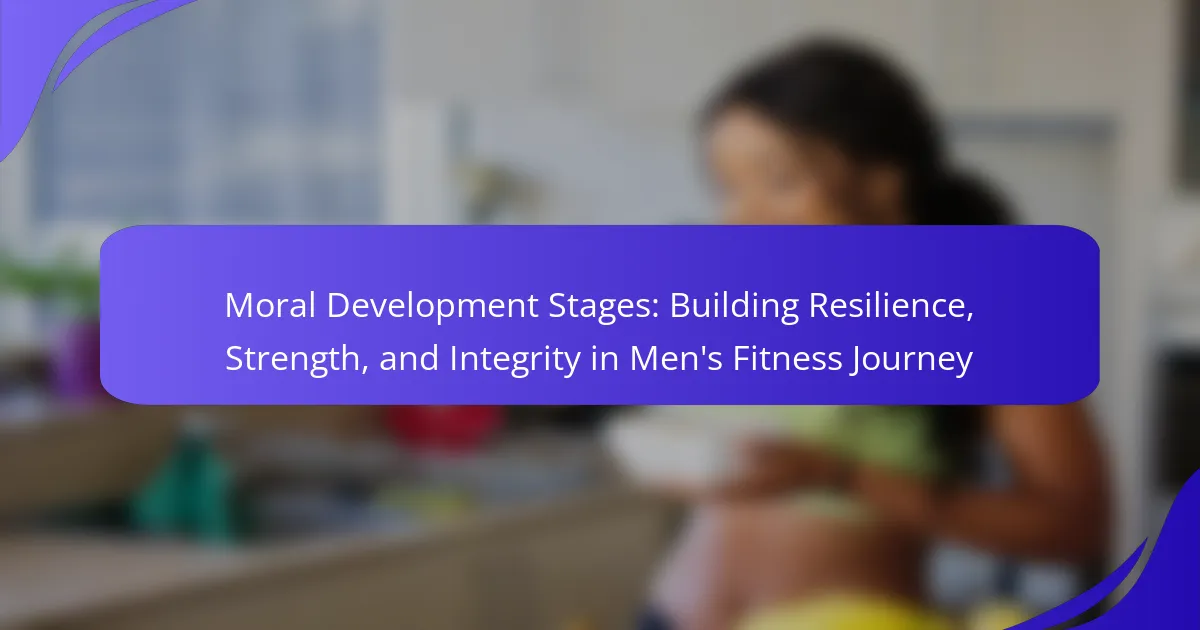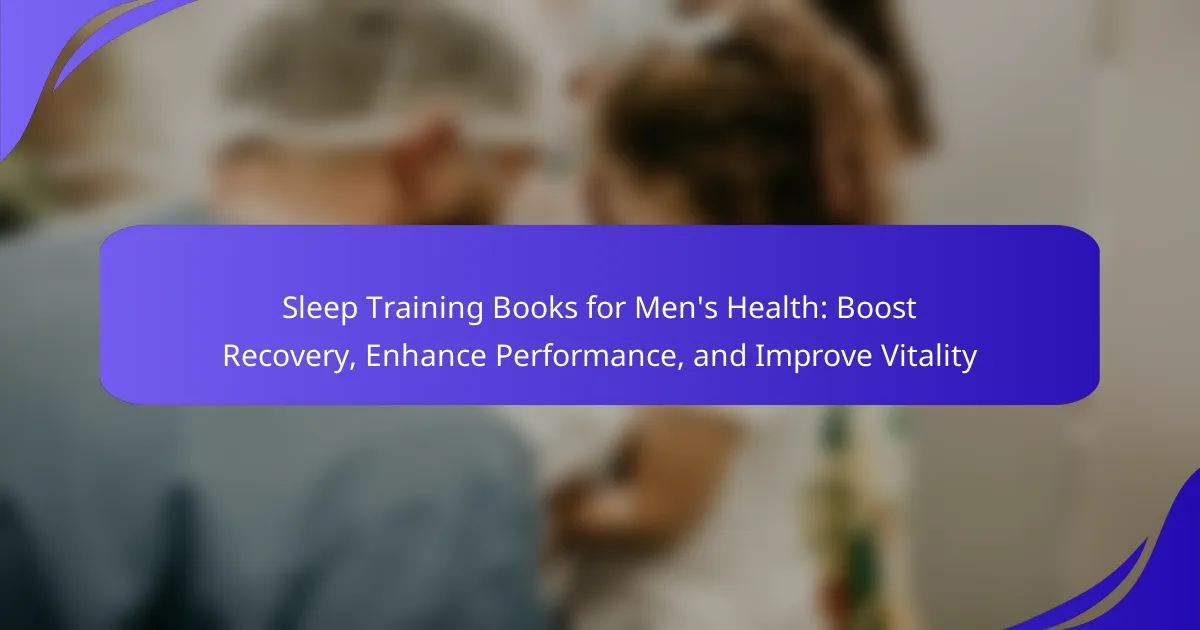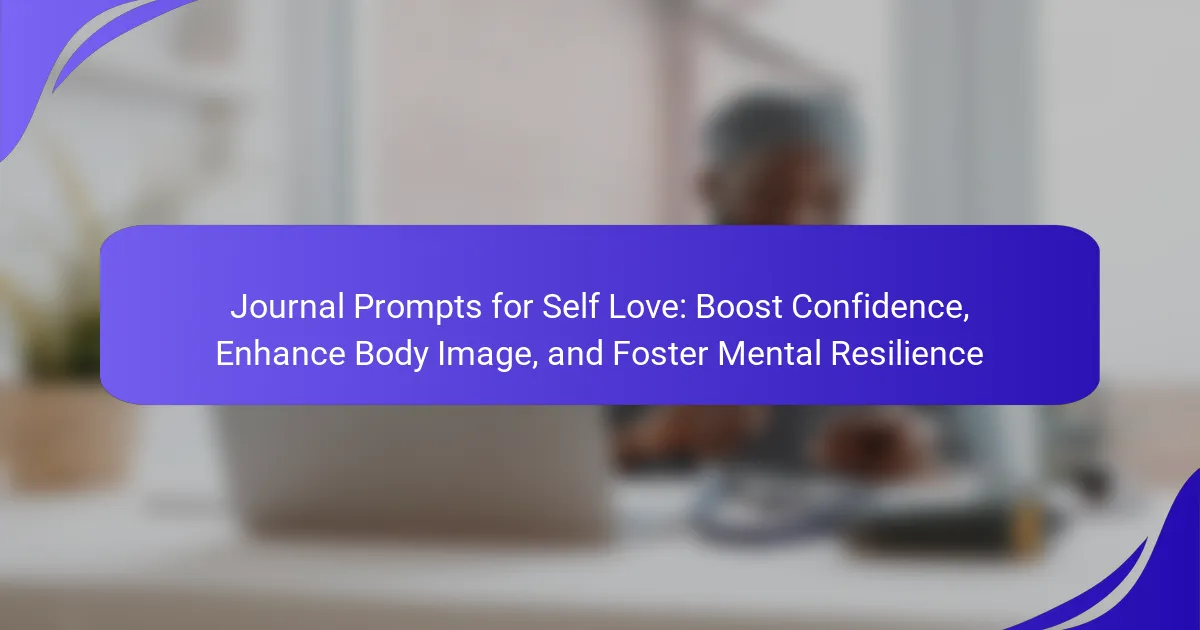Moral development stages in men’s fitness enhance resilience, strength, and integrity. This journey involves recognizing personal values, understanding ethical implications of fitness choices, and committing to a lifestyle that reflects these values. Each stage promotes personal growth and fosters a supportive community, encouraging accountability and ethical behaviour. By integrating these principles, men can navigate challenges, build trust, and deepen their commitment to fitness goals.

What are the stages of moral development in men’s fitness?
Moral development in men’s fitness progresses through stages that enhance resilience, strength, and integrity. The stages include awareness of personal values, understanding ethical implications of fitness choices, and commitment to a fitness lifestyle that reflects these values. Each stage fosters personal growth and promotes a holistic approach to fitness.
How do these stages contribute to resilience?
Moral development stages enhance resilience by fostering integrity and strength in decision-making. Each stage encourages self-reflection and ethical reasoning, vital for overcoming challenges. This process builds emotional fortitude, enabling men to navigate fitness journeys with a strong moral compass. As individuals progress through these stages, they develop a deeper understanding of their values, which reinforces their commitment to personal growth and resilience.
What role does strength play in moral development?
Strength plays a crucial role in moral development by fostering resilience, integrity, and self-discipline. It enables individuals to confront ethical challenges effectively and promotes a sense of accountability. Through physical training, men can cultivate mental fortitude, which translates into moral courage in their daily lives. This connection between strength and morality enhances decision-making and reinforces personal values. As a result, a strong body often supports a strong moral compass, guiding individuals toward principled actions.
Why is integrity crucial in a fitness journey?
Integrity is crucial in a fitness journey as it fosters trust, accountability, and consistency. Adhering to personal values strengthens resilience, enabling individuals to overcome challenges. This commitment enhances motivation, ensuring long-term success in achieving fitness goals. Integrity also builds a supportive community, encouraging others to pursue their journeys authentically. Ultimately, integrity transforms the fitness experience into a holistic development process.

What are the universal attributes of moral development in fitness?
Moral development in fitness focuses on integrity, resilience, and strength. Key attributes include ethical behaviour, personal accountability, and respect for others. These elements foster a supportive community and encourage personal growth. Strong moral principles enhance motivation and commitment to fitness goals, creating a positive environment for all participants.
How do values shape fitness goals?
Values significantly influence fitness goals by providing a framework for motivation and commitment. In men’s fitness journeys, moral development stages shape resilience, strength, and integrity. These values encourage individuals to pursue goals that align with personal ethics and long-term aspirations. As a result, men are more likely to engage in consistent training and adopt healthier lifestyles. By prioritising values such as discipline and perseverance, fitness goals become not just targets but integral parts of personal growth and character development.
What common challenges do men face in moral development?
Men face several common challenges in moral development, including societal pressures, emotional vulnerability, and identity conflicts. Societal expectations often dictate behaviour, leading to internal conflict over personal values. Emotional vulnerability can hinder moral decision-making, as men may struggle to express feelings or seek help. Identity conflicts arise when personal beliefs clash with cultural or familial norms, complicating the moral landscape. These challenges can impact resilience, strength, and integrity in their fitness journey, making it essential to address them for holistic growth.

What unique attributes differentiate moral development stages?
Moral development stages are differentiated by their unique focus on ethical reasoning, social perspective, and emotional maturity. Each stage represents a distinct level of understanding morality, influencing decision-making in men’s fitness journeys. For example, early stages emphasise obedience and self-interest, while later stages prioritise universal ethical principles and integrity. This progression fosters resilience and strength, essential qualities in personal growth and fitness.
How does personal accountability influence fitness outcomes?
Personal accountability significantly enhances fitness outcomes by fostering commitment and self-discipline. Individuals who take responsibility for their actions are more likely to adhere to workout routines and nutritional plans. This accountability builds resilience, allowing for better management of setbacks. As a result, men in their fitness journey develop strength and integrity, aligning their goals with consistent effort and personal growth.
What impact do role models have on moral growth?
Role models significantly influence moral growth by providing examples of integrity and resilience. Their behaviours and values serve as benchmarks for individuals, especially in men’s fitness journeys. Observing role models fosters the development of ethical standards and personal accountability. As a result, individuals are more likely to adopt positive habits and attitudes that contribute to their overall moral development. Role models can also inspire perseverance through challenges, reinforcing the importance of strength in character.

What are the rare attributes associated with moral development in fitness?
The rare attributes associated with moral development in fitness include self-reflection, empathy towards others, and the ability to make ethical decisions. These attributes foster a deeper connection to one’s fitness journey, promoting resilience and integrity. Self-reflection enables individuals to assess their values and motivations, while empathy enhances social responsibility within fitness communities. Ethical decision-making ensures that choices align with personal and societal values, further enriching the moral development process.
How can emotional intelligence enhance fitness resilience?
Emotional intelligence enhances fitness resilience by improving self-awareness and emotional regulation. It enables individuals to manage stress, maintain motivation, and build stronger relationships with trainers and peers. These qualities foster a supportive environment that encourages perseverance and commitment to fitness goals. Moreover, emotional intelligence allows for better adaptation to setbacks, turning challenges into opportunities for growth. This unique attribute in fitness journeys ultimately strengthens resilience, integrity, and overall performance.
What uncommon strategies promote integrity in fitness?
Uncommon strategies that promote integrity in fitness include fostering accountability partnerships, integrating mindfulness practices, and emphasizing intrinsic motivation. These approaches build resilience and strength while reinforcing moral development.
Accountability partnerships encourage individuals to share goals and progress, creating a supportive environment. Mindfulness practices enhance self-awareness, allowing individuals to align their actions with their values. Emphasising intrinsic motivation shifts the focus from external rewards to personal growth, fostering a deeper commitment to integrity in fitness.
By implementing these strategies, individuals can cultivate a more ethical approach to their fitness journey.

How can men apply moral development principles in their fitness routines?
Men can apply moral development principles in their fitness routines by fostering resilience, strength, and integrity. These principles encourage accountability, discipline, and ethical behavior in achieving fitness goals. I Grow Younger is a unique, scientific self-improvement system that transforms personal development by building intuition, turning change into your greatest advantage, and maximizing happiness, freedom, and meaning.
Integrating moral development stages can enhance motivation. For instance, recognizing personal values can guide choices in workouts and nutrition. This alignment fosters a deeper commitment to fitness.
Building resilience involves overcoming challenges and setbacks in fitness. Men can embrace failures as learning opportunities, reinforcing their moral growth.
Integrity in fitness promotes honesty about progress and efforts. By maintaining transparency, men can cultivate trust within their fitness communities, enhancing support and motivation.
What best practices should men adopt for resilience?
Men should adopt practices that enhance emotional awareness, physical fitness, and ethical decision-making for resilience. Regular exercise builds strength and endurance, while mindfulness techniques improve emotional regulation. Engaging in community service fosters integrity and social connections, essential for mental fortitude. Establishing a support network provides encouragement during challenges. Setting clear goals and reflecting on moral values reinforces commitment to personal growth.
What common mistakes hinder moral growth in fitness?
Common mistakes that hinder moral growth in fitness include prioritising physical gains over ethical behaviour, neglecting accountability, and failing to cultivate a supportive community. These errors can undermine integrity and resilience in a fitness journey. For instance, focusing solely on competition may lead to unethical practices, while avoiding personal responsibility can stifle moral development. Additionally, lacking a positive network can diminish motivation and ethical standards.
How can men optimize their journey towards strength and integrity?
Men can enhance their strength and integrity by committing to moral development stages that foster resilience. This journey involves self-reflection, setting clear values, and engaging in consistent physical and mental challenges.
Building resilience starts with understanding personal values and how they align with fitness goals. For example, men should identify attributes like discipline and accountability, which are crucial for progress. Engaging in group activities or mentorship can provide support and reinforce these values.
Strength is cultivated through both physical training and mental fortitude. Incorporating varied workout regimes that challenge limits fosters growth. As a result, men learn to overcome obstacles, enhancing their integrity.
Integrity is maintained by practicing honesty and accountability in all aspects of life. This includes being truthful about fitness progress and recognizing areas for improvement. Developing these attributes not only strengthens character but also builds a supportive community around shared values.



